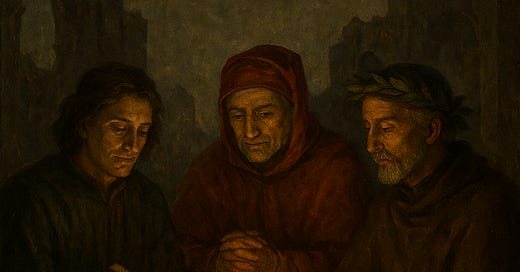Renaissance 2.0: The Future Is a Choice - Part 1
We are not just inheritors of the future - we are its designers
The Spark in the Ashes That Refused to Die
History doesn't repeat - it echoes.
Seven centuries ago, amid the obscure corridors of dogma, a few minds chose to defy the gravitational pull of ignorance.
The world was then a field of superstition and feudal oppression. Yet, in the shadow of cathedral walls and castles on the hills, three Italians planted seeds that would awaken Europe from its slumber.
They didn't wield swords. They wielded thought.
Alberti, Boccaccio, and Petrarch - three minds, cracked the bubble of intellectual darkness of perception, and created the path for vision.
Humanism: Awakening of the Soul
Francesco Petrarch rediscovered Cicero as an echo from civilisations that created democracy and the republic - the pulse of reason. A scholar with a poet’s heart, he exalted the intellect as a pathway to meaning.
Through him, the soul of ancient Rome, and even more ancient Greece, seeped into the bones of a new Europe.
Giovanni Boccaccio, his contemporary and comrade, painted life not in halos of knights' heroics but in sweat, laughter, desire, and death. The Decameron - his book of tales written during the plague - showed that love, the greatest power in the world, endures. At the same time, logic falters, and humanity, in all its flawed elegance, deserves to be chronicled honestly.
His characters didn’t preach virtue; they lived it.
Leon Battista Alberti, the archetype of the uomo universale (universal man), built more than buildings - he constructed the structure of the modern mind. A master of code, canvas, and column, he returned to the ancients not with nostalgia but with blueprints.
His writings reanimated antiquity.
Together, these three did something quietly radical. They turned attention inward - to the mind, the body, the individual - replacing eternal sin with finite wonder. They were not rebels. They were restorers.
Titans Who Turned the Tide
The Renaissance wasn’t a moment; it was a momentum. It pulled others into its orbit - giants whose names still echo in our consciousness.
Leonardo da Vinci sketched helicopters five centuries before lift-off. Michelangelo chiselled divinity from marble. Galileo discovered that we are not the center of the universe after all. Gutenberg scattered thoughts across the continent with movable type. Copernicus, Erasmus, Machiavelli - each with a pen in hand - dismantled and rebuilt the architecture of thought.
These weren't just polymaths. They were cultural tectonics, shifting the foundation of what it meant to be human.
They were Titans!
The Decade of Revolution
A history is never settled. Today’s world, too, reels beneath its own delusions - ecological collapse, political theatre, yawning inequality and technological frenzy, we call progress.
And once again, we are asked to choose: do we drift or shift into disaster, or a rebirth?
We can no longer afford the slow pace of Florence on the road to the Renaissance. For what they had centuries to shape, we must do in a decade; but the Renaissance 2.0 must happen.
We stand at the edge of irreversible ruin. The Earth is warming. The oceans are rising. The soil is turning sterile, and the skies are poisoning our lungs. The crisis isn’t coming - it’s here. We must envisage the path forward - now.
Yet, our leaders still suggest moderation.
Moderation never changed the world!
Titans 2.0: A Blueprint for Action
We need Titans now - not of bloodline or conquest, but of conscience and clarity. Engineers who understand ecosystems. Artists who inspire movements. Coders who encode ethics. Entrepreneurs who calculate impact before profit.
We have the resources and mindpower to change the world.
Renaissance 2.0 (R2.0) is not nostalgia. It is a necessity.
The original Renaissance reclaimed forgotten knowledge. R2.0 must reclaim forgotten and ignored wisdom and combine it with modern tools.
It must not be just the birth of a new culture, but a new contract between people and people, between people and the planet, and between thought and action.
R2.0 is not calling for a return to the past. It's calling for a leap forward, powered by the wisdom of our predecessors and the incredible resources we possess.
Planting the Future in the Soil of Our Imagination
The Renaissance didn’t begin with cathedrals or city-states. It began with conversations—private letters, shared texts, slow rediscoveries — and so it must again, but faster, much faster.
This is your invitation.
R2.0 begins not with governments, but with gatherings; not with institutions, but with imaginations.
We’re building an ecosystem for thinkers, doers, makers, and dreamers, a platform for new structures of collaboration, education, and regeneration.
The Dark Ages ended when we remembered how to think.
This one will end when we remember how to act.
The future doesn’t need another Messiah.
It requires many minds to move together toward a dawn of our own design.
We must begin - now!
The next chapter, the second in a series of Renaissance 2.0, is about the Awakening of Titans, and will be published next.
The previous article in the Renaissance 2.0 series is: Bottom Line of Organisational Design Part 8
If you found this post interesting, please consider restacking it and sharing it with your audience.
You will guide my writing in the future if you share your thoughts in the comments





